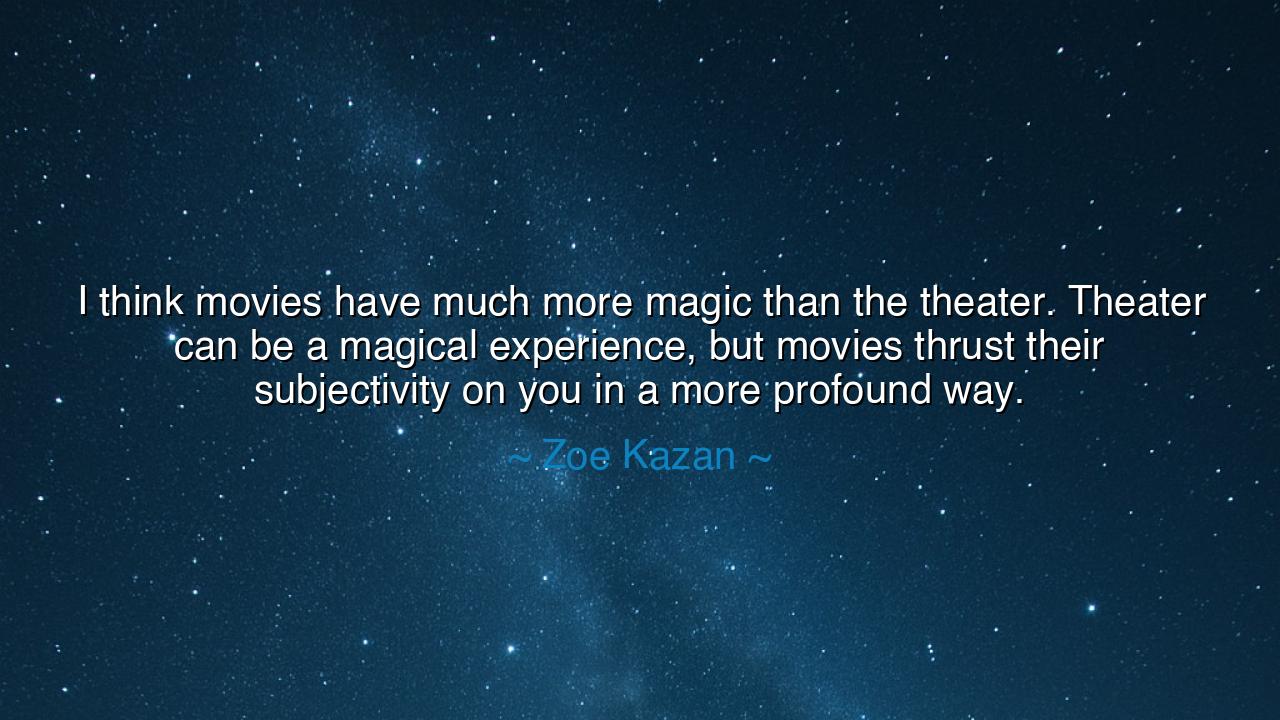
I think movies have much more magic than the theater. Theater
I think movies have much more magic than the theater. Theater can be a magical experience, but movies thrust their subjectivity on you in a more profound way.






Listen closely, O seekers of wisdom, to the words of Zoe Kazan, who speaks with deep understanding of the unique power of movies: “I think movies have much more magic than the theater. Theater can be a magical experience, but movies thrust their subjectivity on you in a more profound way.” In these words, Kazan draws our attention to a profound truth about the two great forms of artistic expression—theater and film—and their ability to influence the audience. Theater invites us into a shared space, where the energy between performer and audience flows freely. But film, Kazan suggests, has a magical quality that is more direct and intimate, forcing us to confront its world in a way that is personal, often without escape.
In the ancient world, the Greeks revered theater as one of the highest forms of art. Sophocles, Euripides, and Aeschylus wrote tragedies that did not merely entertain but demanded deep reflection. The audience in the great Greek amphitheaters was exposed to the collective experience, the performance unfolding before them in real-time, where every gesture, every word, was shared in a sacred space. Theater, in this way, created a communal magic, a shared bond between those who acted and those who watched. Yet, Kazan’s words speak to a new era of art, where film has taken the baton of emotional intimacy, guiding us through a world that feels closer, more personal, more subjective.
Consider, O wise ones, the tale of Aristotle, whose Poetics explored the profound emotional catharsis that both the theater and poetry could evoke in the audience. Aristotle believed that the power of tragedy lay not just in its narrative, but in its ability to make the spectator experience the emotions of the characters on a deeply personal level. In theater, the audience was a collective entity, yet the emotional experience was shared. However, movies, like the ones Kazan speaks of, thrust us into the individual experience—the lens of the camera focuses on the protagonist’s world, and suddenly we are inside their emotions, seeing through their eyes. The camera becomes not just a tool for capturing images but a device that forces the audience to confront subjectivity in a way that theater cannot.
Think, too, of the ancient bards who sang of heroes and gods—they did not perform for a single person, but for the collective of their people. Yet, with the advent of film, like movies, the act of storytelling has become more intimate. The camera, like the bard’s voice, speaks directly to the soul of the viewer, but with a precision that brings the story not to the community, but to one heart at a time. Consider the story of Orpheus, whose music was so powerful that it could charm even the stones. In theater, his music would have been shared, an experience for many. But in film, Orpheus' song would be something felt in the solitude of the viewer’s soul, pulling them into the world of the movie with an immediacy that theater cannot replicate.
There is a deeper lesson in Kazan’s words, O seekers. The world of film offers a unique magic because it can enter the soul of the viewer with a quiet intensity. It is not bound by the limitations of the stage, where the audience is part of a shared experience. A movie asks you to become part of its world, to see through its lens, and, often, to be transformed by it. Movies, in Kazan’s view, demand that we experience their subjectivity, and in doing so, they offer us a more profound connection to the art, one that penetrates deeper than mere spectacle.
Think of the profound emotional impact of a film like Schindler’s List. Though the story could have been told on stage, the cinematic experience brings us closer to the heart of the tragedy. The camera, the silence, the closeness of the faces—these details bring us into the world of the story in ways that the theater cannot. Kazan’s words reflect this same magic: film invites the viewer into the subjectivity of the world on screen in a way that can be more direct, more intimate, more immediate.
Therefore, O future generations, the lesson here is to embrace the power of both forms of storytelling, theater and film, for each carries its own magic. The theater offers a shared experience, where the audience and the actors are one, while movies offer an intimate journey into the soul, inviting us into worlds we might never otherwise enter. The magic of film lies in its ability to shrink the distance between the audience and the story, allowing us to feel not just spectators, but participants in the unfolding of the plot. Kazan’s insight is a call to recognize that both mediums, though vastly different, are tools through which the human spirit finds expression. Choose both with care, knowing that each can reveal truths about the world and about yourself.






AAdministratorAdministrator
Welcome, honored guests. Please leave a comment, we will respond soon